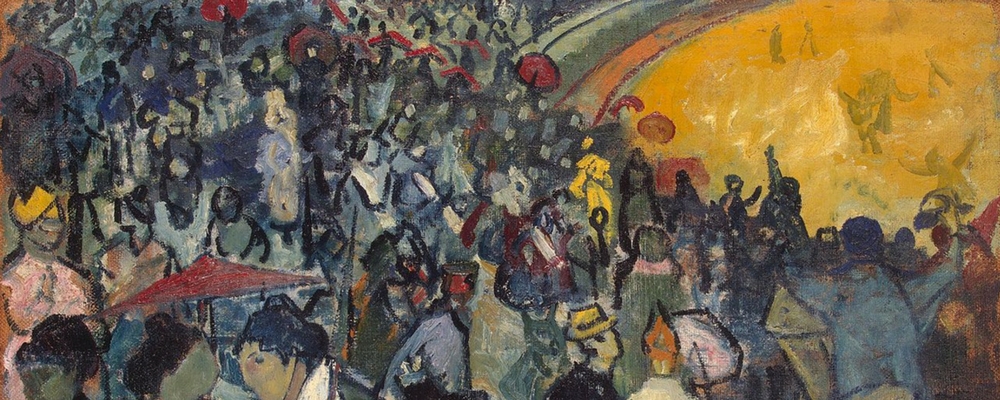A Time for Dreaming
There was a time for dreaming
and the hope of order.
That has gone by.
The air is swirling,
but the poet is still.
There is a scum on his well
and he is drowning silent.
He can’t make water, air
and cannot even scream.
Gravely, he gulps the thickness
and chokes upon the last of fear
- bitter, the taste of rage,
and voiceless.
The poet hated noise,
preferring solitude within silence.
It’s past too late.
There is no light to write by
or even read.
The poet wishes he had dined
with Kafka and his Hunger Artist
and then gone mad with van Gogh.

The Hunger Artist -- Mario González
 Spectators in the Arena at Arles -- Vincent van Gogh
Spectators in the Arena at Arles -- Vincent van Gogh
There was a time for dreaming
and the hope of order.
That has gone by.
The air is swirling,
but the poet is still.
There is a scum on his well
and he is drowning silent.
He can’t make water, air
and cannot even scream.
Gravely, he gulps the thickness
and chokes upon the last of fear
- bitter, the taste of rage,
and voiceless.
The poet hated noise,
preferring solitude within silence.
It’s past too late.
There is no light to write by
or even read.
The poet wishes he had dined
with Kafka and his Hunger Artist
and then gone mad with van Gogh.

The Hunger Artist -- Mario González
 Spectators in the Arena at Arles -- Vincent van Gogh
Spectators in the Arena at Arles -- Vincent van Gogh
"In the last decades interest in hunger artists has declined considerably. Whereas in earlier days there was good money to be earned putting on major productions of this sort under one’s own management, nowadays that is totally impossible. Those were different times. Back then the hunger artist captured the attention of the entire city. From day to day while the fasting lasted, participation increased. Everyone wanted to see the hunger artist at least daily. During the final days there were people with subscription tickets who sat all day in front of the small barred cage. And there were even viewing hours at night, their impact heightened by torchlight. On fine days the cage was dragged out into the open air, and then the hunger artist was put on display particularly for the children. While for grown-ups the hunger artist was often merely a joke, something they participated in because it was fashionable, the children looked on amazed, their mouths open, holding each other’s hands for safety, as he sat there on scattered straw—spurning a chair—in a black tights, looking pale, with his ribs sticking out prominently, sometimes nodding politely, answering questions with a forced smile, even sticking his arm out through the bars to let people feel how emaciated he was, but then completely sinking back into himself, so that he paid no attention to anything, not even to what was so important to him, the striking of the clock, which was the single furnishing in the cage, merely looking out in front of him with his eyes almost shut and now and then sipping from a tiny glass of water to moisten his lips...
ReplyDelete“'I always wanted you to admire my fasting,' said the hunger artist. 'But we do admire it,' said the supervisor obligingly. 'But you shouldn’t admire it,' said the hunger artist. 'Well then, we don’t admire it,' said the supervisor, 'but why shouldn’t we admire it?' 'Because I had to fast. I can’t do anything else,' said the hunger artist. 'Just look at you,' said the supervisor, 'why can’t you do anything else?' 'Because,' said the hunger artist, lifting his head a little and, with his lips pursed as if for a kiss, speaking right into the supervisor’s ear so that he wouldn’t miss anything, 'because I couldn’t find a food which I enjoyed. If had found that, believe me, I would not have made a spectacle of myself and would have eaten to my heart’s content, like you and everyone else.' Those were his last words, but in his failing eyes there was the firm, if no longer proud, conviction that he was continuing to fast.
“'All right, tidy this up now,' said the supervisor. And they buried the hunger artist along with the straw. But in his cage they put a young panther. Even for a person with the dullest mind it was clearly refreshing to see this wild animal throwing itself around in this cage, which had been dreary for such a long time. It lacked nothing. Without thinking about it for any length of time, the guards brought the animal food. It enjoyed the taste and never seemed to miss its freedom. This noble body, equipped with everything necessary, almost to the point of bursting, also appeared to carry freedom around with it. That seem to be located somewhere or other in its teeth, and its joy in living came with such strong passion from its throat that it was not easy for spectators to keep watching. But they controlled themselves, kept pressing around the cage, and had no desire to move on."
--tr. Ian Johnston